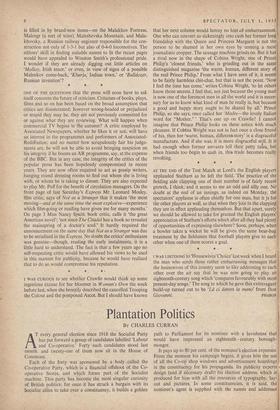ONE OF THE QUESTIONS that the press will soon have
to ask itself concerns the future of criticism. Criticism of books, plays, films and so on has been based on the broad assumption that critics are disinterested; however wrong-headed or prejudiced or stupid they may be, they are not previously committed for or against .what they are reviewing. What will happen when commercial TV begins in the autumn? A critic employed by Associated Newspapers, whether he likes it or not, will have an interest in the programmes and performers of Associated- Rediffusion; and no matter how scrupulously fair his judge- ments are, he will not be able to avoid bringing suspicion on his integrity if he boosts an AR programme, say, at the expense of the BBC. But in any case, the integrity of the critics of the popular press has been hopelessly compromised in recent years. They are .now often required to act as gossip writers, .hanging round dressing rooms to find out whom she is living with, or whom he is taking to dinner. They are also expected to play Mr. Puff for the benefit of circulation managers. On the front page of last Saturday's Express Mr. Leonard Mosley, film critic, says of Not as a Stranger that it, makes 'the most moving—and at the same time the most explosive—experience which film-going or reading have given me for many months.' On page 3 Miss Nancy Spain. book critic, calls it 'the great American novel'; 'not since The Citadel has a book so revealed the mainspring of a doctor's soul.' It hardly required the announcement on the same day that Not as a Stranger was due to be serialised in the Express. No doubt the critics' enthusiasm was genuine—though, reading the early instalments, it is a little hard to understand. The fact is that a few years ago no self-respecting critic would have allowed his views to be used in this manner for publicity, because he would have realised that to do so would compromise his reputation.














































 Previous page
Previous page